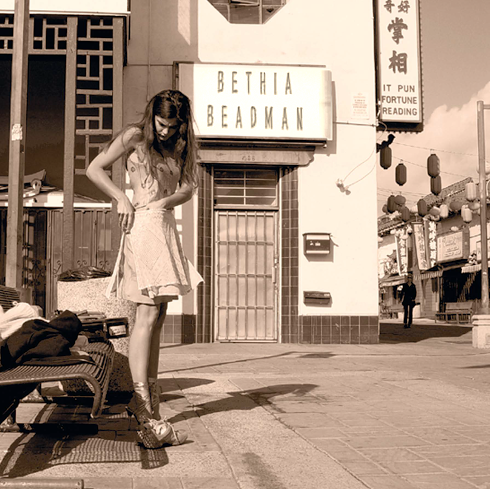In Roman Polanski’s 1974 mystery Chinatown, Jack Nicholson’s Jake Gittes is asked if his cut hurts. "Only when I breathe", he replies. Something similarly noir and inescapably aware of the general pain of existence runs through the third, often thrilling album from East London’s charismatic Bethia Beadman. Like its predecessors, it is candid, open-hearted and straining for a release/fulfilment that only, it would seem, singing can provide. This Chinatown is built on alleys of yearning, bruised backstreets coloured by fading desire, foundations of blind faith that things will turn. Somehow an opaque optimism emerges from its angst: "Better get over you while I’m still strong", it concludes.
If previous low-profile, lo-fi releases Made Of Love and The Old Ships showcased a singer-songwriter probing personal wounds and displaying an innate elementalism that most singers this century can only dream of or hint at hubristically, they lacked scale. Chinatown has welcome whispers of bigger sets, loftier production values. It’s still incredibly intimate and confessional, but recording at Peter Gabriel’s Real World studios has brought out degrees of dynamic, light and shade and – importantly – some body, some whoomph. Self-produced "unconsciously", it was tracked in four days with her band, and impressive, cinematic strings were added later. (As were backing vocals from Metronomy’s Gbenga Adelekan). While there is no shortage of her trademark twisted-folk and minimalist torch songs, it’s a respite in places to hear some music swell, surge, even engage with a beat. The stand-out ‘Lady London’ is almost rock, jerking into jouissance with staccato guitar jabs and a swaggering gait. Lyrically it remains staunchly feminine, dealing with the "black dog" by noting "he was a puppy once, so I smile at him".
London, however, does not infuse this record. It’s nobody’s definition of urban. Rather it rings of her native West Country and frequent travels to America’s South. It refuses to acknowledge any music made since the 70s, blissfully residing in a fantasy-world where Neil’n’Joni float against the machine. Beadman’s brilliantly strange back-story, which colours her flamboyant live persona – growing up in an underground grotto, training as a dancer, studying Theology and Sanskrit at Cambridge, singing in a choir at the Vatican then (by implausible contrast) fetching up for a while as keyboardist in Courtney Love’s band – tints the music implicitly rather than explicitly. Chinatown isn’t a firework display sonically: the voice and persona again provide the emotional pyrotechnics. In the more fluidly dramatic numbers like ‘Horses’ ("I slipped into my coffin bath and reached the open sea", it begins with gothic guile) and ‘Mary’ (which offers a subtly addictive groove and feel), that’s plenty.
"I’m going to be an ancient queen", she sighs, a credible ambition on an album which also earnestly references mythology, goddesses, geography and "bygone times". On ‘Lydia’, "Lydia Byzantine sits on an island of her own, far beyond the Roman wall…" While it might be interesting to hear it channelled through more contemporary stylings, it’s this out-of-time aspect, this allergy to modern mores, which distinguishes her as an intriguing voice.
Self-professed outsiders are ten a penny in art, but Bethia Beadman is the real thing, the bohemian misfit’s bohemian misfit. Lazy comparisons may be made to Patti Smith and PJ Harvey as "influences", but Beadman is a rarity, an original, influenced chiefly by her own psyche, which is bold and crazy enough to think a cross between Ziggy Stardust and Maria Callas is what today’s moribund music needs. The thing is, it does. A zone of tangles and tousles and sorrowful psalms, this is one Chinatown you won’t easily forget.
<div class="fb-comments" data-href="http://thequietus.com/articles/17489-bethia-beadman-chinatown-review” data-width="550">


